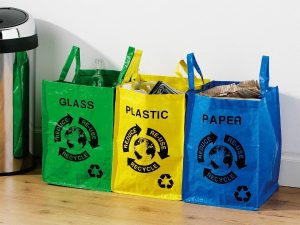Are you struggling to reduce plastic use in your home? In this first instalment from Ethical.net, we learn why we should be aiming to reduce our plastic use, why recycling isn’t enough and how to get started reducing food-related plastic waste.
The problem of plastic is one of the major global challenges facing us today. Awareness of this issue is increasing, which is good news, but many people struggle to see how to play their part in solving it. Fortunately, there are many great ways to reduce plastic use in your home.
Plastic is absolutely everywhere. The sea of plastic that surrounds us in our daily lives can make the problem seem overwhelming, so some people think that it is out of their hands – that only politicians and big business can solve it. But while it is true that larger-scale political and business reforms are essential, there is still plenty that individuals can do.
Reducing plastic use largely comes down to two things: reducing the amount that we buy, and seeking out alternatives to plastic products. But before we delve into the solutions in a little more depth, let’s take a quick look at why we need to reduce plastic use.
Why reduce household plastic use?
The life cycle of plastic makes clear why we should reduce its use in our homes. At source, plastic takes a lot of energy to create, and is derived from finite and polluting fossil fuels.
Plastic has also been shown to be detrimental to human health during its life; many types of plastic leach harmful chemicals into the environment during manufacture, and sometimes also during use.
It is after its useful life, however, that plastic really begins to pose a threat: it can take hundreds of years – or more – to break down, meaning that it lingers, causing problems in our wider environment. Plastic is now found in huge quantities in the world’s oceans and in global food chains. If we do not all act quickly to reduce plastic use, we threaten the cycles of our planet and our very ways of life.

Credit: Angela Compagnone on Unsplash
Why recycling plastic is not enough
Recycling plastics is one partial answer to the problem – but isn’t a complete solution. The stark truth is that most of the plastics we encounter on a daily basis cannot or will not be recycled.
Even when plastic can be recycled, contamination can also be a big problem. You might have washed out your plastic containers and put them in the correct bin, but that doesn’t mean that everyone else will. If something hasn’t been washed out properly, it can result in everything in that bin going to landfill rather than the recycling plant.
Even plastic that is recyclable is not always recycled, for economic reasons; often, it is simply not profitable for recycling businesses to recycle lower-grade plastics. There is an urgent need for greater transparency in the recycling system, so consumers know exactly where their waste is going, what percentage really is recycled, and how much energy is required to do so.
Recycling plastic uses roughly double the energy, labour, and machinery necessary to put it in landfill. And all recycling has some environmental costs, including more trucks on the road.
What’s more, many people are shocked to learn that most plastics can only be recycled once or twice before they are down-cycled, which means they are recycled into something else – such as textiles. Almost invariably, clothes or other items made from old plastic bottles, for example, cannot themselves be recycled – so they will still be a problem to dispose of at the end of their useful lives.
While we should, of course, recycle what we can, recycling alone is not enough. Reducing our plastic use and re-using what plastics we have to use is essential to tackling the problem effectively. So how exactly do we go about reducing plastic use at home?
Reduce plastic packaging coming your home
Plastic packaging is a major problem area within plastic waste. Food packaging generally accounts for the majority of plastic waste generated in most households, so reducing that can be a good place to begin.
Reducing plastic food packaging
Here are some tips to help reduce the amount of plastic food packaging that comes into your home:
- Grow as much of your own food as possible. (You can grow some food even if you have no outside space at all; all you need is a sunny windowsill.)
- Buy un-packaged, local, organic produce wherever possible. Consider local veg box schemes, visit farm shops, etc. Buy less, but buy better to stay within budget.
- Buy household staples wholesale to reduce packaging. (Also consider ordering staples online through companies that avoid plastic packaging – such as Plastic Free Pantry.)

Credit: Markus Spiske on Unsplash
- Choose and cook with whole foods as much as possible, and avoid ready meals and other heavily packaged items. Take a list when shopping to avoid impulse buys.
- Learn new skills by making yogurts, jams, and preserves, for example, rather than buying these readymade.
- Avoid teabags that contain plastic – switch to an eco brand, or to loose-leaf tea.
- Avoid coffee capsules – grind your own instead, if possible.
- Take your own shopping bags to the shops and don’t use plastic bags. (Though doing away with single-use plastic bags is a step in the right direction, reusable plastic bags still often end up in landfill or as litter. Take a natural bag or receptacle shopping instead – for example, one made from organic cotton or hemp, or a wicker basket.)
- Take your own container to a butcher, fishmonger, bakery, or deli, and ask them to use that rather than wrapping your purchases in plastic.
Read more about biodegradable plastic.
Stay tuned for Part 2 coming soon, tackling household cleaning, toiletries and more.
Main image by Jasmin Sessler on Unsplash. Find the original article by Elizabeth Waddington on the Ethical.net blog.
 About the author
About the author
Ethical.net is a collaborative platform for discovering and sharing ethical alternatives, whether purchasing from a social enterprise, thrift shopping, or learning how to fix your old phone instead of buying a new one. They aim to make ethical the new normal.







1 Comment
I am trying very hard to remove plastic from our house we already do a lot of what is on your list. I have a problem in that we use washable hand wipes for our granddaughter and we have to take them out with us I presently use a plastic box and a plastic bag to put the used ones in especially now because of covid, I obviously can’t use something made with china as it is too heavy to carry in our knapsacks I would appreciate some recommendations please. Thanks Ann